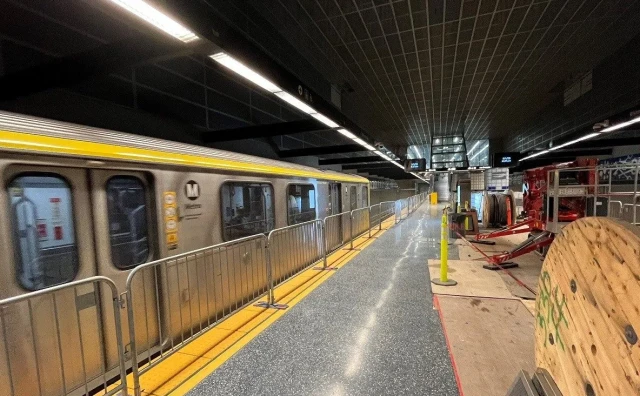With our free press under threat and federal funding for public media gone, your support matters more than ever. Help keep the LAist newsroom strong, become a monthly member or increase your support today during our fall member drive.
Merchants Feel Sting Of Credit, Debit Fees

Merchants, just like consumers, are raising their voices about fees they have to pay to credit card companies. Retailers are pressing Congress to limit these fees. But banks and credit card companies are dead set against any such move.
At a small strip mall in Merrimack, N.H., Carolyn Mooney and her son run the Hope's One Stop convenience store. Mooney says many of her customers are having a tough time weathering the recession.
"Those people who rush in on a Saturday or Sunday morning to get milk — instead of buying a whole gallon they buy a half-gallon," Mooney says. "Everyone is downsizing."
The same is true for beer. The customer who once took home a box of 18 cans now leaves with just a six-pack.
Plastic Pangs
The drop in revenue is bad enough for merchants like Mooney, but if the customer pays with plastic it hurts even more. That's because merchants pay a set fee plus a percentage on each sale.
But as Mooney's average sale amount goes down, the set fee goes up. As a result, her customers' buying habits are squeezing a bottom line that's already under pressure.
"On the cost of a $5 purchase item, we lose a dollar of that sale," Mooney says.
Twenty New Hampshire stores shut down last year, according to the New England Convenience Store Association. Card fees might not be the owners' biggest headache, but an extra $1,000 or $5,000 out the door each year is tough to manage these days.
Controlling the cost of plastic is particularly frustrating because the world of card fees makes the Byzantine Empire look like a meeting of the local PTA.
Jacques Breton, vice president of MJM Associates, is in the business of getting merchants like Mooney to sign contracts to process their credit and debit card charges.
The single biggest cost to merchants is something called the interchange fee, the percentage that is tacked on to each sale.
Two decades ago, there were a handful of interchange rates. Today merchants face about 200, and the percentage changes depending on the sort of plastic the customer uses.
Rewards Card Woes
One of the most lucrative for the banks — and most expensive for the merchants — is the rewards card that offers free air miles and other perks. The money for those rewards comes from the merchants through interchange fees.
Breton says the banks push rewards cards heavily: "I've seen financial institutions that had a standard credit card, no bells and whistles, turn around and offer to their good customers rewards cards so as to increase the interchange level — make more money."
Banks and credit card companies point to one independent report that shows the average interchange rate has dropped a bit over the past few years.
Nessa Feddis, senior counsel for the American Bankers Association, says the card business is extremely competitive and merchants like Mooney should take advantage of that.
"There are many service providers out there," Feddis says. "Sometimes they can be cheaper, but she should shop around."
Feddis says credit and debit cards are convenient and merchants should expect to pay their fair share for providing that service. Breton, who is in the business of selling this service, has his own strategy to ease the burden on merchants.
"At my regular retail establishments that are friends of mine here locally, I pay cash," Breton says. "I give them a check."
The next time you're at the checkout counter, depending on how you feel about the merchant, you might want to ask yourself the quintessential question: Paper or plastic?
Copyright 2022 New Hampshire Public Radio. To see more, visit New Hampshire Public Radio. 9(MDA1OTI3MjQ5MDEyODUwMTE2MzM1YzNmZA004))
At LAist, we believe in journalism without censorship and the right of a free press to speak truth to those in power. Our hard-hitting watchdog reporting on local government, climate, and the ongoing housing and homelessness crisis is trustworthy, independent and freely accessible to everyone thanks to the support of readers like you.
But the game has changed: Congress voted to eliminate funding for public media across the country. Here at LAist that means a loss of $1.7 million in our budget every year. We want to assure you that despite growing threats to free press and free speech, LAist will remain a voice you know and trust. Speaking frankly, the amount of reader support we receive will help determine how strong of a newsroom we are going forward to cover the important news in our community.
We’re asking you to stand up for independent reporting that will not be silenced. With more individuals like you supporting this public service, we can continue to provide essential coverage for Southern Californians that you can’t find anywhere else. Become a monthly member today to help sustain this mission.
Thank you for your generous support and belief in the value of independent news.

-
Restaurants share resources in the food hall in West Adams as Los Angeles reckons with increasing restaurant closures.
-
It will be the second national day of protest against President Donald Trump.
-
The university says the compact, as the Trump administration called it, could undermine free inquiry and academic excellence.
-
This is the one time you can do this legally!
-
Metro officials said it will be able to announce an opening date “soon.”
-
While working for the county, the DA’s office alleges that 13 employees fraudulently filed for unemployment, claiming to earn less than $600 a week.







